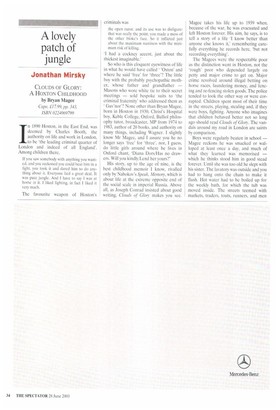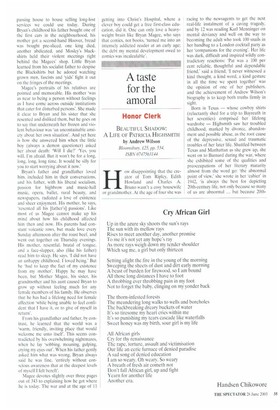A lovely patch of jungle
Jonathan Mirsky
CLOUDS OF GLORY: A HOXTON CHILDHOOD by Bryan Magee Cape, £17.99, pp. 343, ISBN 02240159799 1 n 1890 Hoxton, in the East End, was deemed by Charles Booth, the authority on life and work in London, to be 'the leading criminal quarter of London and indeed of all England'. Among children there,
If you saw somebody with anything you wanted, and you reckoned you could beat him in a fight, you took it and dared him to do anythine about it. Everyone lied a great deal. It was pure jungle. And I have to say I was at home in it. I liked fighting, in fact I liked it very much.
The favourite weapon of Hoxton's criminals was
the open razor. and its use was to disfigure: that was really the point, you made a mess of the other bloke's face. So it inflicted just about the maximum nastiness with the minimum risk of killing.
'I had a cockney accent, just about the thickest imaginable.' So who is this eloquent eyewitness of life in what he would have called —Oxton' and where he said 'free' for 'three'? The little boy with the probably psychopathic mother, whose father and grandfather — Masons who wore white tie to their secret meetings — sold bespoke suits to 'the criminal fraternity' who addressed them as Guv'nor'? None other than Bryan Magee, born in Hoxton in 1930, Christ's Hospital boy. Keble College, Oxford, Balliol philosophy tutor, broadcaster, MP from 1974 to 1983, author of 20 books, and authority on many things, including Wagner. I slightly know Mr Magee, and I assure you he no longer says 'free' for 'three', nor, I guess, do little girls around where he lives in Oxford chant, 'Diana Dors/Has no drawers. Will you kindly/Lend her yours?' His story, up to the age of nine, is the best childhood memoir I know, rivalled only by Nabokov's Speak, Memory, which is about life at the extreme opposite end of the social scale in imperial Russia. Above all, as Joseph Conrad insisted about good writing, Clouds of Glory makes you see. Magee takes his life up to 1939 when, because of the war, he was evacuated and left Hoxton forever. His aim, he says, is to tell a story of a life 'I know better than anyone else knows it,' remembering carefully everything he records here, 'but not recording everything'.
The Magees were the respectable poor as the distinction went in Hoxton, not the 'rough' poor who depended largely on petty and major crime to get on. Major crime revolved around illegal betting on horse races, laundering money, and fencing and re-fencing stolen goods. The police tended to look the other way or were corrupted. Children spent most of their time in the streets, playing, stealing and, if they were boys, fighting. Anyone who imagines that children behaved better not so long ago should read Clouds of Glory. The vandals around my road in London are saints by comparison.
Boys were regularly beaten in school — Magee reckons he was smacked or walloped at least once a day, and much of what they learned was memorised — which he thinks stood him in good stead forever. Until she was too old he slept with his sister. The lavatory was outside and you had to hang onto the chain to make it flush. Hot water had to be boiled up for the weekly bath, for which the tub was moved inside. The streets teemed with markets, traders, touts, runners, and men passing house to house selling long-lost services we could use today. During Bryan's childhood his father bought one of the first cars in the neighbourhood, his mother got a second-hand Hoover, bread was bought pre-sliced, one king died, another abdicated, and Mosley's blackshirts held their violent meetings right behind the Magees' shop. Little Bryan learned from his socialist father to despise the Blackshirts but he adored watching grown men, fascists and 'yids' fight it out on the fringes of the meetings. Magee's portraits of his relatives are pointed and memorable. His mother `was as near to being a person without feelings as I have come across outside institutions that cater for disturbed persons'. She made it clear to Bryan and his sister that she resented and disliked them, but he goes on to say that underneath her frozen and violent behaviour was an uncontainable anxiety about her own situation'. And yet here is how she answered him when the little boy (always a demon questioner) asked her about death: Will I die?"Yes. you will. I'm afraid. But it won't be for a long, long, long, long time. It would be silly for you to start worrying about it now.' Bryan's father and grandfather loved him, included him in their conversations, and his father, with his liberal socialism, passion for highbrow and music-hall music, opera, ballet, rural beauty, and newspapers, radiated a love of existence and sheer enjoyment. His mother, he says, 'resented all his [father's] passions', Like most of us Magee cannot make up his mind about how his childhood affected him then and now. His parents had constant volcanic rows, but made love every Sunday afternoon after the roast beef, and went out together on Thursday evenings. His mother, resentful, brutal of tongue, and a face-slapper, also (like his father) read him to sleep. He says, 'I did not have an unhappy childhood. I loved being.' But he 'had to keep the fact of my existence from my mother'. Happy he may have been, but Mother Magee, his sister, his grandmother and his aunt caused Bryan to grow up without feeling much for any female members of his family. He observes that he has had a lifelong need for female affection `while being unable to feel confident that I have it, or to give of myself in return'.
From his grandfather and father, by contrast, he learned that the world was a 'warm, friendly, inviting place that would welcome me unto itself'. This seems contradicted by his overwhelming nightmares, when he lay 'sobbing, moaning, gulping, crying my eyes out'. When his father gently asked him what was wrong, Bryan always said he was fine, 'entirely without conscious awareness that at the deepest levels of myself I felt bereft'. Magee devotes slightly over three pages out of 343 to explaining how he got where he is today. The war and at the age of 11 getting into Christ's Hospital, where a clever boy could get a free first-class education, did it. One can only love a heavyweight brain like Bryan Magee, who says that comics, not books, 'turned me into an intensely addicted reader at an early age; the debt my mental development owed to comics ■■ as incalculable'.



































































 Previous page
Previous page